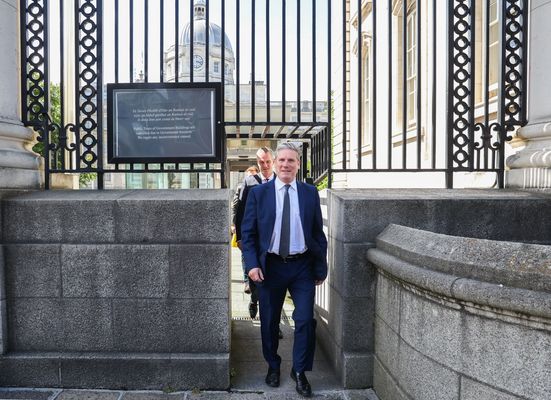AS a last ditch attempt to save his government and his own position as head of it, Rishi Sunak pulled three rabbits out of the hat. First, the Rwanda Bill (sorry, the Safety of Rwanda Act) was rammed through Westminster with the prospect of flights exporting asylum seekers to begin in July. At last, ex-Home Secretary Suella Braverman’s dream will come true.
A few days before the local government elections in England and Wales, the Home Office started rounding up and detaining asylum seekers, prompting activists to block the unmarked vans and buses involved. Clear electioneering which, as it turned out, failed to prevent the Tory electoral meltdown.
Peckham high road is now completely blocked by people resisting the Bibby Stockholm removal as well as blocking the arrests made by police.
— Southwark & Lambeth Anti-Raids (@SLAntiRaids) May 2, 2024
There are many many more of us than the police. They’re not going anywhere.
Come and join us and we can stop them together. https://t.co/qRnKepu65g pic.twitter.com/rqKqYE9gNJ
The second rabbit was the announcement of another 'Kick the Sick' campaign: Sunak’s war on 'sicknote culture'. Some of us are old enough to remember Peter (now Lord) Lilley’s star turn at the Tory party conference in 1992 when he vowed to “close down the something for nothing society”, using a “little list” which included “bogus asylum seekers”, but was mainly about “bogus claims”. John Major’s government at the time was trying to mask unemployment levels by transferring people from unemployment to sickness/invalidity benefits. Thatcher started this but Major pushed it harder.
The Disability Poverty Campaign Group (DPCG) which I co-lead release a statement on The Health and Disability Green Paper
— Dan White : Disability Campaigner & Author ♿️ (@Danwhite1972) April 30, 2024
The paper was announced after yesterdays reckless assault on Disabled people and benefits
Read the full response here: 👇https://t.co/XadG45WtZF pic.twitter.com/cKukL4L3Qo
Twenty years later, the long-term sick and disabled were hit particularly hard by the Tories’ austerity measures which froze benefits and made it harder to claim much-needed discretionary supports. They were also subject to stressful work capability assessments. One strand of all this was the replacement of Disability Living Allowance (DLA) by Personal Independence Payments (PIP), with the express purpose of cutting spending on benefits here in the North. Together with the introduction of Universal Credit, the Tories aimed to cut the budget here by £3 billion (it was £7.3 billion at the time). Bizarrely, DLA popped up in the News Letter a couple of weeks ago (April 20) in an interview with the UUP’s general election candidate in North Down, 'maverick' retired British army colonel Tim Collins. His main message was to attack Alliance as “pro-nationalist” but he added, with true military precision, that people will not vote for a united Ireland if it meant losing their DLA.
So the Tories want to introduce a tougher regime for PIP and stop GPs signing people off as sick, especially if they are mentally unwell. They are talking about restricting PIP spending by replacing financial support in some cases with 'treatment' and/or by vouchers. For some PIP recipients, it may involve keeping receipts to be approved every time they purchase anything related to their disability. In Toryland, there’s nothing like a dose of financial insecurity to cure mental illness. More electioneering, except that kicking claimants is nothing like as popular as it used to be, even in the British tabloids.
The third rabbit Sunak pulled out of the hat was the latest cut in national insurance contributions. There was a cut in January, followed by the latest one announced in the March budget and implemented for the new tax year beginning in April. From the government’s own estimates, £19,130 million (over £19 billion) less will be collected in national insurance contributions in 2024/25. For the North this amounts to £400 million. Make no mistake, this is about English politics and the forthcoming general election.
It is likely that the Tory manifesto will include a promise to do away with national insurance altogether, something that has long been the goal of the Tufton Street brigade, including the Institute of Economic Affairs and TaxPayers' Alliance. Sunak has already said that this will be paid for by cuts to working age benefits. One of Sunak’s idols is Nigel Lawson, who was Chancellor of the Exchequer for six years (1983-89) under Thatcher. Even forty years ago, the abolition of national insurance was a twinkle in the eye of the Tory right, but Lawson resisted it on the grounds that this would “destroy the contributory principle and create many losers, especially among the elderly”.
A secret, unpublished memo from Margaret Thatcher’s tax-cutting chancellor Nigel Lawson - whose portrait Rishi Sunak hung above Treasury desk - warned against merging NI & income tax b/c it would “create many losers” incl pensioners 👀@jessicaelgot https://t.co/BEpQIS7uep
— Pippa Crerar (@PippaCrerar) April 30, 2024
Contrast this with social insurance in the Republic where the political argument is about broadening the base of contributions and widening the scope of benefits to include more earnings-related provision, especially for short periods of unemployment or sickness. The report of the Commission on Taxation and Welfare (2022) put a lot of emphasis on the principles behind social insurance: social solidarity and reciprocity, equity of treatment, universal coverage and adequacy of benefits. Some of its recommendations went too far for Taoiseach Leo Varadkar who at the time described them as “straight out of the Sinn Féin manifesto”.
Social insurance is also close to another debate that surfaced last week over the costs of uniting Ireland. Economists John Fitzgerald and Edgar Morgenroth received a great deal of publicity for their claim that: “funding the needs of the people of Northern Ireland in a united Ireland would put huge financial pressure on the people of Ireland, resulting in an immediate major reduction in their living standards.” They argue a deficit would persist for many years after unification and “there would have to be a dramatic increase in taxation and/or a major reduction in expenditure”.
This was then translated into the following question in a Red C poll (26 counties only), published 28 April: “I would vote YES/NO in a referendum for a united Ireland even if it cost the state €20 billion per year for 20 years." The question was introduced by saying these costs were “as suggested recently in an ESRI report”. Wrong – this was not an Economic and Social Research Institute report but one from the Institute of International and European Affairs; misleading information introducing a leading question. Anyway, 42 per cent said no to unity and only 28 per cent said yes (the rest were undecided). Perhaps next time Red C will ask if people are for or against unity if it means lower housing costs and better public services.
Brendan O’Leary and John Doyle responded to the report by showing that the “alleged subvention” as described by “doomsters” Fitzgerald and Morgenroth is grossly exaggerated because the British Treasury’s figures overestimate expenditure and underestimate tax receipts. In fact, the doomsters make no effort to apply the Irish tax code to the North’s population. In particular, the idea that the British would cease to honour past records of national insurance and public sector occupational pension contributions does not stack up, either legally or politically: “Terminating payments of UK public pensions for former veterans, police, nurses and teachers with full British citizenship rights would have devastating reputational disadvantages."
Detailed discussion this morning on @BBCTalkback on the cost of a United Ireland and my critique of recent reports. First 30 mins on https://t.co/NyhroHZbRt
— John Doyle (@JohnDoyleDCU) May 3, 2024
It is interesting that some economists, clearly opposed to unity, are now seriously engaged in the discussion of costs. But they only go so far. For example, Esmond Bernie, former UUP MLA, imagines that ‘unity’ simply means that Dublin rather than London becomes responsible for the subvention to “some sort of devolved regional government” that remains in the North. No – whatever else it means, a united Ireland needs to be a unitary authority for taxation and spending on major programmes such as cash benefits.
Welcome response to my 2021 article on the Northern Ireland Subvention from Esmond Bernie. I disagree with some of the conclusions, but the debate is welcome. I will have more to say in response soon. https://t.co/XabnHKUPRW
— John Doyle (@JohnDoyleDCU) November 23, 2023
The argument about the subvention is not only important to the future, it is also of direct relevance to the present and the current funding of public services. The idea that the North lives well, even excessively, beyond its means and must raise more in local taxes and charges runs through the financial settlement that came with the restoration of Stormont. The British government has placed several other conditions on the funding as well, but the one that stands out is the “minimum of £113 million” that “must” be raised through locally generated income for 2024-25.
There is a whiff of fiscal colonialism about this. On the one hand the British government has just increased the subvention by £400 million through the cut in national insurance contributions, over which the North has no choice or control, and on the other hand, we are required to raise £113 million from local rates and charges.
This is politics not economics.







